
Getting to the heart of the questions most important to your potential audience is an unbeatable path to providing best-answer solutions.
Let’s look also at why question research is such an important facet in marketing, and some of the primary ways to uncover precisely what people are using search engines and other search technology to ask and learn more about.
In 2017 our Senior Content Marketing Manager Caitlin Burgess looked at this topic, in “Beyond Google Keyword Planner: 7 Easy-to-Use SEO Research Tools for Generating Content Ideas,” and in the interim new tools have become available, and new features have been added to several.
Let’s look at 10 smart tools and tactics to help uncover the questions your audience is asking.
Question Research & User Intent Tools — What are the Benefits?
These types of tools can help you:
- Uncover new details about your audience
- Gather an abundance of topics that are both hyper-relevant to your audience and well-suited to SEO best-practices
- Spark new ideas
- Save time and boost efficiency
- Look beyond preconceived notions about your audience
- Put yourself in your audience’s shoes
- Find questions your audience wouldn’t ask friends, family, and associates, or necessarily divulge to focus groups or share on surveys
What Do People Really Want, and Why is Finding Questions Important?
via GIPHY
When Sir Tim Berners-Lee invented the Web in 1989, one of his biggest goals was to make it easier for people to find information on the Internet — which dates to 1974, and its earlier incarnation ARPANET, dating back to 1969 — an ambition that has undoubtedly seen tremendous success perhaps beyond any other technology in history.
Yet even with billions of people using the Web every day to learn, relatively few explore the questions being asked, and the intent and format these searches take. There’s a lot to learn from examining these questions closely.
Not all search engine query data is public or available, of course, however there is a vast amount of anonymized question information that anyone can access, research, and learn from, including the selection of tools we’ll explore here. Some are free and others subscription-based but with free trial offers, allowing you to test out their user intent and question analysis features.
“Find out what questions your customers are asking and answer them with your content.” @LeeOdden Share on XUnderstanding search intent in its four incarnations including informational, navigational, commercial, and transactional is covered in detail by our Content Strategist Anne Leuman in “The Key to SEO & Content Marketing Success: Understanding Search Intent,” a topic also explored by by Tom Salvat for Marketing Insider Group in “How to Build Your Content Marketing Plan with Keyword Search Intent.”
When marketers understand #SearchIntent, we can create #content more tailored to our audience’s specific needs, problems, and questions—helping gain visibility, attract more qualified traffic, & build trust. @annieleuman Share on X#1 — StoryBase
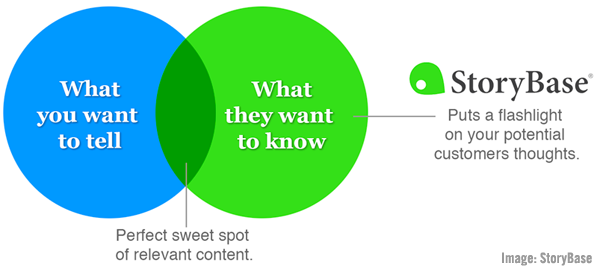
Tool: StoryBase
Twitter: @storybase
First up is StoryBase, which offers a hefty collection of tools for examining and learning from search queries, plus “digital brainstorm” utilities to help dig into how and why people search.
Focusing on how people search and what can be learned from the questions they ask, StoryBase uses Google search data and ties in to Google Search Console, offering natural-language-based features aimed at helping you provide the most relevant answers.
In addition to finding new content ideas from search query information, StoryBase tools also let you see demographic information for topical keyword data and measure various aspects of search performance.
Offered as a subscription-based service, StoryBase, founded by Torbjørn Flensted, has a 14-day free trial period available to try out all levels of its service.
“Innovative companies answer the questions that their customers should be asking.” @ValaAfshar Share on X#2 — SEMrush
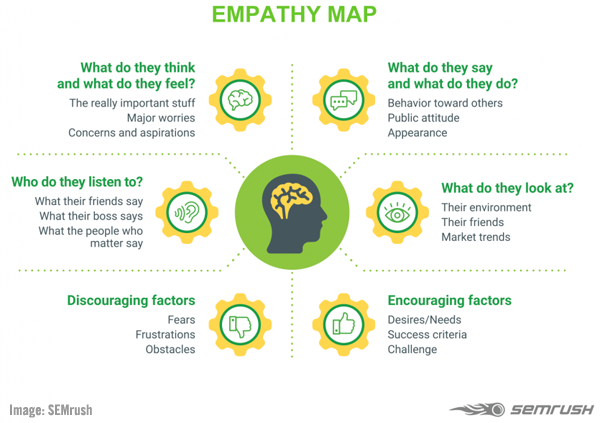
Tool: SEMrush
Twitter: @semrush
Next in our randomly-ordered list comes SEMrush, which offers a sizable array of tools for helping search and content marketers uncover details about both their own search campaigns and those of competitors, including several tools that are useful for revealing user intent and questions.
SEMrush’s Topic Research competitive research tool helps you explore the most searched for and shared topics and questions on a per-domain basis, and allows for detailed related search analysis, while the Keyword Magic Tool provides additional methods to expand your search intent keywords.
The question of search intent and how it relates to optimization is explored in a recent article by Ann Smarty for Content Marketing Institute, “Why You Shouldn’t Ignore Search Intent Optimization.”
“How can you be the best answer for your audience if you don’t understand what questions they’re asking or what problems they’re trying to solve?” — Lane R. Ellis @lanerellis Share on X#3 — Ahrefs
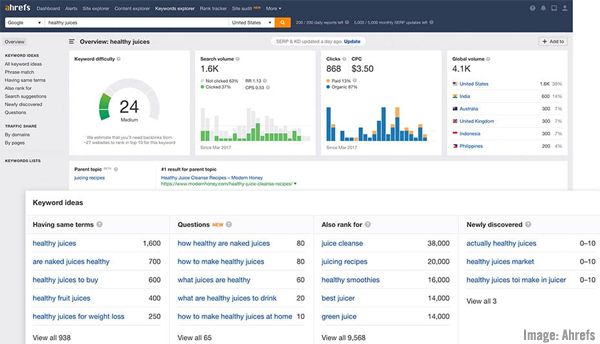
There’s a reason Ahrefs has grown in popularity in recent years, as more marketers recognize the usefulness of its collection of search-related tools. For digging in to the questions your audience is asking Ahrefs offers several utilities, including the Keywords Explorer, Content Explorer, and Content Gap tools.
A subscription-based service offered at various price points based on usage volume needs, Ahrefs has a free trial period available, allowing you to try out its search intent and array of other search-related features.
In Search Intent: The Overlooked ‘Ranking Factor’ You Should Be Optimizing for in 2019, by Joshua Hardwick, head of content at Ahrefs, several examples show how Ahrefs can help uncover user intent.
A recent Above the Fold podcast looks closely at using Ahrefs to learn from search intent, as company CMO Tim Soulo shares his tactics in the episode “Tim Soulo of Ahrefs talks searcher intent (and how it can 5x your traffic).”
Another of Ahref’s tools is dedicated to uncovering the questions people are asking specifically on YouTube, and the company’s active YouTube channel offers a number of helpful videos on the subject, including the recent “YouTube Keyword Research: How to Get More Views Consistently.”
#4 — Google Search Console
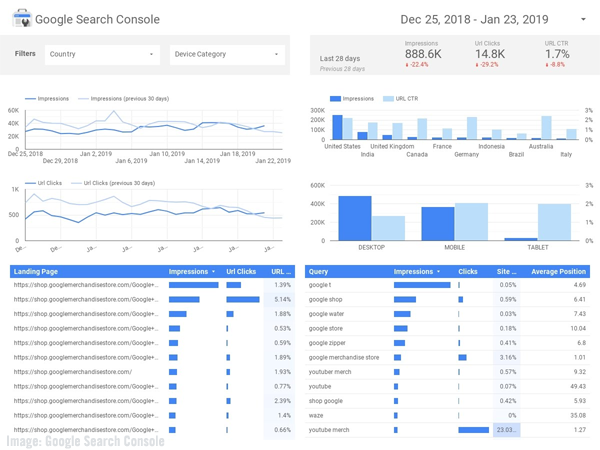
Tool: Google Search Console
Twitter: @googlewmc
Up next in our question analysis tool list is Google’s extensive and free Search Console, which has been a staple in the question analysis and keyword research toolkit of many marketers for years, and with heaps of insightful data presented in easy-to-digest portions, marketers who haven’t yet tapped into this resource ought to give it a try.
“From a content planning perspective, Google Search Console allows you to see which queries actually caused your site’s content to appear in search results.” @CaitlinMBurgess Share on XRecent Google Search Console Resources:
How consumer needs shape search behavior and drive intent, by Justin De Graaf, Head of Ads Research and Insights at Google, for Think with Google
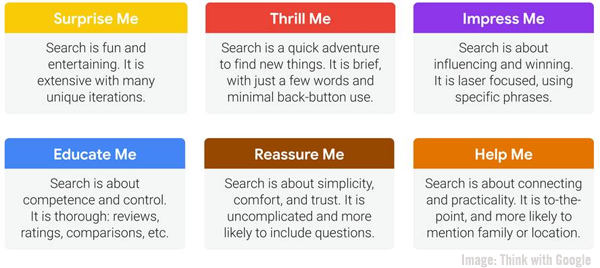
- Recent helpful Google Search Console video from Google’s webmaster YouTube channel: “Google Search: State of the Union (Google I/O’19)”, featuring Google’s Martin Splitt and John Mueller.
- Search Engine Roundtable’s Barry Schwartz looked at some of the ways that Google Search Console has changed, in “Google Search Console Performance Report Now Shows Consolidation Data.”
- “The Art and Science of Looking at SERPs on Google” by Gianluca Fiorelli for The Inbounder takes a deep dive into many aspects of Google data, including searcher intent.
- Google’s Keyword Planner tool also offers audience and search intent information, and a helpful video from Ahrefs digs into some lesser-known features of Google Keyword Planner, with “How to use Google Keyword Planner: 6 Hacks Most SEOs Don’t Know Exist.”
#5 — KeywordTool.io
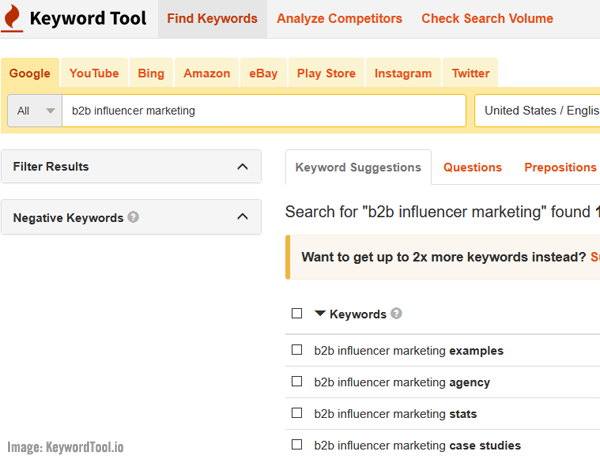
Tool: KeywordTool.io
Twitter: @keywordtoolio
That brings us to KeywordTool.io, which taps into Google’s automatic search suggestions and Google Trends data to surface relevant keywords and questions to learn many of the things your audience is looking for.
KeywordTool.io offers a free version presenting over 750 Google keyword suggestions, while a paid Keyword Tool Pro option — offered at three subscription levels for those needing the ability to search up to 7,000, 35,000, or 70,000 keywords daily — adds the expected premium options, along with access to certain cost-per-click (CPC) information, bulk search volume checking, and support for all the cities, countries, and languages supported by Google.
“Finding trends in what your current customers need can help you answer questions that your prospective customers might be asking, too.” — Jessica Best @bestofjess Share on X#6 — BuzzSumo’s Question Analyzer
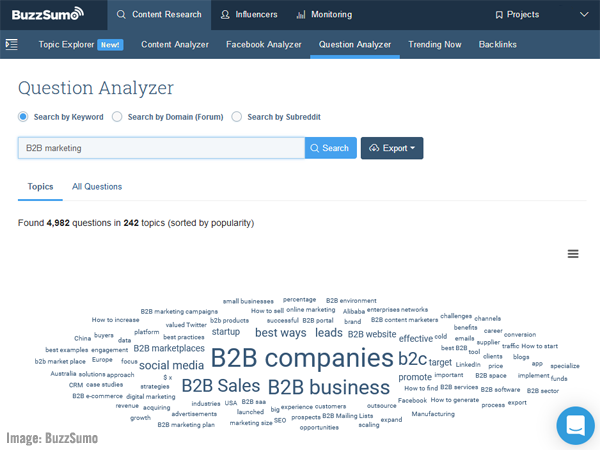
Tool: BuzzSumo
Twitter: @BuzzSumo
Let’s now look at BuzzSumo’s helpful Question Analyzer tool, which queries a large pool of questions being asked on social platforms, Amazon, Quora, Reddit and other message forum sites, along with other data, and allows users to find a cornucopia of questions related to keywords, all sorted by topic and presented with helpful information such as query volume.
The Question Analyzer is one of many tools included with BuzzSumo, a subscription-based service that offers a free trial to learn first-hand how its powerful features work.
Our own Senior Digital Strategy Director Ashley Zeckman has explored how research tools can help uncover customer needs.
“The amount of data available today while daunting, provides an incredible amount of insights into what customers want.” — Ashley Zeckman @azeckman Share on X#7 — Answer the Public
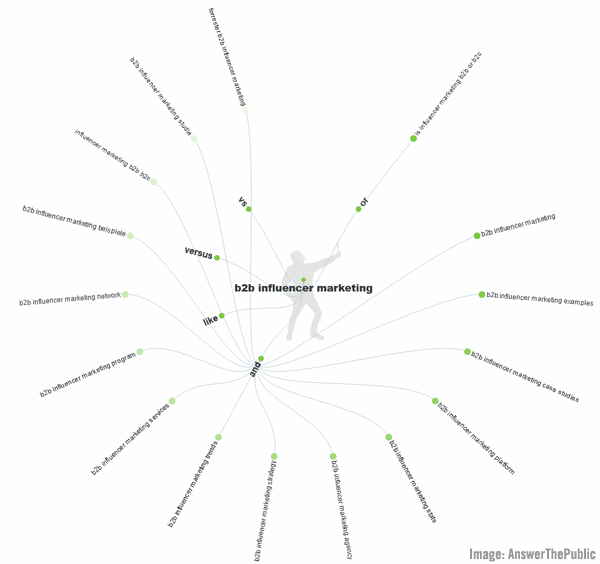
Tool: Answer the Public
Twitter: @answerthepublic
The last company on our list of some of the available user intent tools is Answer the Public. Turning Google and Bing’s automatic search suggestions into informative and attractive charts, Answer the Public serves up helpful visual results using question modifiers including who, what, when, where, how, why, and more.
Answer the Public helps pinpoint not only the questions your audience may be asking, but offers a glimpse into some of the deeper emotional reasons behind the searches, potentially opening up new areas to pursue in your campaigns.
Answer the Public is available as a free tool for marketers who need only a limited number of search insights each month, or in a professional monthly subscription version offering unlimited searches, higher-resolution graphs, location-based and language-specific results and other extras.
“Devoting time to audience intent research, you’ll get a pulse on the changing customer journey and be better able to create best-answer solutions.” — Lane R. Ellis @lanerellis Share on X#8 — Ask Directly with Polls, Surveys, Focus Groups & Questionnaires
There are many ways aside from search engine query research to find the questions people ask, including traditional methods such as focus groups, questionnaires, polls, and surveys.
When it comes to these additional tactics, each comes with its own collection of advantages and disadvantages, and we have dedicated resources available to pursue some of these avenues, including “The Power of Social Media Polls: The Drill-Down on 3 Platforms + 5 General Best Practices.”
#9 — Tap Into Search Intent From Voice Search & Chatbots
More recent innovations for learning search intent include artificial intelligence (AI) powered chatbots and the increasingly-used voice search.
With more people interacting with chatbots and smart-search enabled audio devices, examining any available chatbot transcripts or voice search log files offer another option to find search intent data.
“When it comes to optimizing the customer experience, design for conversation from the start. Remember, the most important thing for the user is convenience.” — Purna Virji @purnavirji Share on XHere are four recent resources for tapping into chatbot and voice search research:
-
- “Enterprise-grade conversational bot,” by the team at Microsoft Azure
- Larry Kim’s “15 Incredible Tools You Never Thought You Needed”
- “Hey Alexa: How Do I Bake Voice Search Into My B2B Marketing Strategy?” by our Senior Content Strategist Nick Nelson
- How to Optimize Customer Experience with AI – Top Tips from Microsoft’s Purna Virji
#10 — Server Log Files, Online Form Queries & E-mail Questions
Your website’s server log files can also contain a wealth of helpful information, potentially showing every search people conduct while on your site. Getting access to this information depends on your organization and whether you host your own site.
Additional ways people ask questions are through any online forms you offer, in private email, and through queries posed on various social media platforms — all information sources you don’t want to overlook when it comes to finding out more about your audience and what they want from you.
Recognize The Differing Ways People Search

It’s worth briefly mentioning that people search is vastly different ways, and as you use the tools we’ve looked at here, you’ll see a wide variety of ways people use to search for essentially the same information.
The technical prowess of a programmer usually results in a different approach to search than what a marketer would undertake. A programmer might use advanced search criteria including Boolean operations, while the majority of searchers generally use a more question-oriented search methodology.
If your target audience falls into either of these camps, it’s worth putting some time and effort into learning how each type searches, and all of the tools presented here can help with this.
Which of These Tools is Best for You?
I recommend trying each and using one or more to build a strategy that works well for your particular industry, budget, and company culture. With so much on offer either for free or through trial periods, there’s nothing stopping you from learning more about your audience.
Finally, here are four bonus resources to help you take what you learn from search intent and use it to build trust and provide best-answer solutions:
- 5 Essential Questions to Guide Your B2B Influencer Marketing Strategy, by Ashley Zeckman
- Trust Factors: How Best Answer Content Fuels Brand Credibility, by Nick Nelson
- How B2B Marketers Can Win at Search with Best Answer Content by Nick Nelson
- How A Best Answer Content Strategy Drives B2B Marketing Results by Lee Odden



